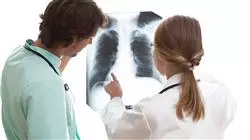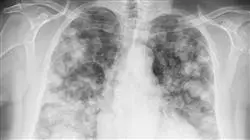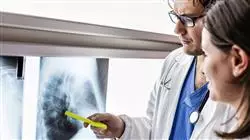University certificate
The world's largest faculty of medicine”
Description
Improve your knowledge through this program, where you will find the best didactic material with real clinical cases. Learn here about the latest advances in the specialty to be able to perform a quality medical practice"

Recent studies have reported a reduction in lung cancer mortality among current and former smokers with a minimum of 30 packs/year following the use of low-dose helical computed tomography, and have provided sufficient evidence to establish strong international recommendations for lung cancer prevention.
Therefore, a more frequent future presentation of lung cancer will be via a solitary pulmonary nodule, a relevant fact given that diagnosis at advanced stages has been the norm in the last 30 years and the reason for the low prevalence of this disease.
Nowadays, talking about oncology means talking about "multidisciplinary teams", about advances in fields of science that are increasingly involved, and this, apart from being interesting, means that we need continuous education that is often difficult to acquire in other courses or congresses since they are oriented to a very specific area and specific to a single specialty.
Not losing this multidisciplinary vision is very important because many advances in one area can have implications in the diagnostic and therapeutic algorithms used in oncology. In fact, one of the skills that we aim for the students to achieve with this postgraduate certificate is to have a broad and clear vision of oncology, and to use the comparison of scientific advances in each area as a tool that will allow them to advance in their knowledge.
Expand your knowledge through the postgraduate certificate in Treatment of Small Cell Lung Cancer and Other Thoracic Tumors, in a practical way and adapted to your needs”
This postgraduate certificate in Treatment of Small Cell Lung Cancer and Other Thoracic Tumors contains the most complete and up-to-date scientific program on the market. The most important features include:
- Development of clinical cases presented by experts in Thoracic Oncology
- The graphic, schematic, and practical contents with which they are created, provide scientific and practical information on the disciplines that are essential for professional practice
- New diagnostic and therapeutic developments on the performance of Thoracic Oncology
- An algorithm-based interactive learning system for decision-making in the clinical situations presented throughout the course
- With a special emphasis on evidence-based medicine and research methodologies in the treatment of small cell lung cancer and other thoracic tumors
- All of this will be complemented by theoretical lessons, questions to the expert, debate forums on controversial topics, and individual reflection assignments
- Content that is accessible from any fixed or portable device with an internet connection
This postgraduate certificate is the best investment you can make when selecting a refresher program, for two reasons: in addition to updating your knowledge in Treatment of Small Cell Lung Cancer and Other Thoracic Tumors you will obtain a qualification endorsed by TECH Technological University”
Its teaching staff includes health professionals belonging to the field of thoracic oncology, who contribute their work experience to this program, in addition to renowned specialists belonging to leading scientific societies.
Thanks to its multimedia content developed with the latest educational technology, they will allow the professionals a situated and contextual learning, that is to say, a simulated environment that will provide an immersive learning programmed to train in real situations.
The design of this program focuses on Problem-Based Learning, by means of which the physicians must try to solve the different professional practice situations that arise throughout the academic year. For this reason, they will be assisted by an innovative, interactive video system created by renowned and experienced experts in the field of thoracic oncology who have extensive teaching experience.
The postgraduate certificate includes real clinical cases and exercises to bring the development of the program closer to the physician’s clinical practice"

Make the most of this opportunity to update your knowledge in Treatment of Small Cell Lung Cancer and Other Thoracic Tumors and improve the care of your patients"
Objectives
The main objective of the program is the development of theoretical and practical learning, so that the physician can master in a practical and rigorous way the Treatment of Small Cell Lung Cancer and Other Thoracic Tumors.

This program will provide you with the skills to carry out your medical practice with confidence and will help you to grow both personally and professionally”
General Objective
- To create a global and up-to-date vision of thoracic oncology and all its aspects, allowing the student to acquire useful knowledge and, at the same time, to generate interest in expanding the information and discovering its application in daily practice
Specific Objectives
- Assess the various therapeutic options available for first and subsequent lines of treatment in SCLC and neuroendocrine tumors
- Explain the cell biology and genetics of low and intermediate grade neuroendocrine tumors
- Identify the role of peptide receptor radionuclide therapy in the treatment of neuroendocrine lung tumors
- Assess the efficacy and safety aspects of the different therapeutic options
- Analyze the multidisciplinary treatment of pulmonary mesothelioma and future treatment options
- Define the prognostic value of the anatomopathological classification of thymomas
- Update on multidisciplinary thymoma treatment and future treatment options
- Discuss the role of surgery in posterior mediastinal tumors
- Delve into the diagnosis and treatment of thoracic wall tumors
- Update on the treatment of secondary pulmonary metastases
- Explain the different surgical options for the management of secondary lesions and their indications, which may, in turn, condition patient management

Make the most of this opportunity and take the step to get up to date on the latest developments in the Treatment of Small Cell Lung Cancer and Other Thoracic Tumors”
Postgraduate Certificate in Treatment of Microcytic Carcinoma of the Lung and other Thoracic Tumors
Lung cancer is one of the most frequent tumors in the world and represents an important cause of mortality. Microcytic carcinoma of the lung is a histological subtype characterized by its aggressiveness and rapid growth. In addition to lung cancer, there are other thoracic tumors that require a specialized approach. For this reason, a Postgraduate Certificate in the Treatment of Microcytic Lung Carcinoma and other Thoracic Tumors has been developed, which offers a complete preparation in the management of these pathologies.Advances in the diagnosis and treatment of lung cancer have allowed greater survival and quality of life for patients. The use of low-dose helical computed tomography, for example, has allowed early detection of lung cancer, which has contributed to a decrease in mortality in smokers and ex-smokers. In this sense, the Postgraduate Certificate in Treatment of Microcytic Lung Carcinoma and other Thoracic Tumors offers an update in diagnostic and imaging techniques, as well as in the most innovative treatments.
Delve into Thoracic Tumors Online
It is important to note that small cell lung carcinoma requires multidisciplinary treatment and specialized care. Radiotherapy and chemotherapy are currently the most effective treatments, although there are also therapeutic options such as immunotherapy and targeted therapy. In addition, other thoracic tumors such as pleural mesothelioma or germ cell tumor also require specialized and personalized attention.In short, the Postgraduate Certificate in Treatment of Microcytic Lung Carcinoma and other Thoracic Tumors offers a complete and updated training in the management of these pathologies. Specialized study in this field is essential to guarantee quality care for patients and an improvement in their prognosis and quality of life.







